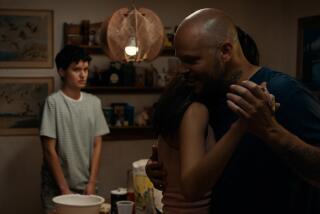MOVIE REVIEW : Passion Fuels ‘Flight of the Innocent’
- Share via
“Flight of the Innocent” (AMC Century 14 and Beverly Center Cineplex) plunges us immediately into 15 minutes of breath-stopping bloodshed and terror. In a beautiful pastoral setting in Calabria in Southern Italy, three men brutally gun down another man; in retaliation an entire family is wiped out with the exception of one 10-year-old boy, Vito (Manuel Colao), who abruptly finds himself running for his life.
In his feature debut, writer-director Carlo Carlei creates an entire world so completely and so cinematically, and with such absolute conviction, that suspension of disbelief becomes total. Carlei has such bravura, such furious energy, we don’t even want to question the credibility of all that happens.
Even after the film is over, when we realize that Vito has truly astonishing stamina and smarts for his age, we’re not in a mood to question anything, so thoroughly has Carlei engrossed us.
What he has done so excitingly, in short, is to bring an innately Italian grace and passion to bear upon a solidly constructed Hollywood thriller plot. The gap between rich and poor, the way in which dire economic conditions breed the worst kind of savagery--these and other concerns emerge along the way, but at heart “Flight of the Innocent” is a jolting, suspenseful and richly satisfying chase picture.
It rests squarely--and easily--on the narrow shoulders of the sober, angelic-looking Manuel Colao, who has formidable poise and powers of concentration and expression for so young an actor.
Carlei and his co-writer Gualtiero Rosella do such an excellent job of not giving anything away that reviewers really ought not reveal much of the plot. During a brief respite in his desperate dash to reach Rome, where an adult cousin lives, Vito does see on TV a couple (Francesca Neri, Jacques Perrin) pleading for the safe return of their kidnaped son. Instinctively, we know that Vito, who is about the same age as the missing boy, and the distraught couple will somehow connect, for Vito has recognized in the wife’s anguish his own fear and pain.
No one could accuse Carlei of subtlety--indeed, Vito’s chief tracker (Federico Pacifici) is heavily, menacingly scarred--but he’s so assured and confident he gets away with one grand flourish after another.
For example, we know that Vito’s mother, hidden by the sheet she has hung out to dry, has been shot when a blood stain rapidly expands over the sheet, which in turn becomes her shroud as she grabs at it while falling. It’s a poetic slo-mo beauty-in-carnage image right out of Peckinpah and samurai movies. Even though it seems flashy here, it does epitomize the film’s assault on the emotions; Carlei appeals boldly to the visceral rather than the rational.
Yet Carlei is capable of irony, which gives his film its depth, for he leaves us realizing that wholesale slaughter of Vito’s family has saved the boy from an almost certain life of crime.
Provocatively, Carlei, amid much bloodshed, suggests that people are inherently good--that Vito instinctively knows right from wrong and is capable of acting bravely upon that knowledge precisely because he’s still too young to have been corrupted by his family. You may not entirely agree with Carlei on this and still be beguiled by “Flight of the Innocent” (rated R for sequences of graphic violence, and for some language).
‘Flight of the Innocent’ Manuel Colao: Vito Putorti Francesca Neri: Marta Rienza Jacques Perrin: Davide Rienzi Federico Pacifici: Scarface
An MGM/UA release of a Franco Cristaldi in association with Rocket Pictures presentation of an Italo-French co-production: Cristaldi/Fandango in collaboration with Raitre (Rome) Fildebroc (Paris). Director Carlo Carlei. Producers Franco Cristaldi, Domenico Procacci. Executive producers Massimo Cristaldi, Bruno Ricci. Screenplay by Carlei, Gualtiero Rosella. Cinematographer Raffaele Mertes. Editors Carlo Fontana, Claudio di Mauro. Costumes Mariolina Bono. Music Carlo Silotto. Production design Franco Ceraolo. Running time: 1 hour, 44 minutes.
MPAA-rated R (for sequences of graphic violence, and for some language).
More to Read
Only good movies
Get the Indie Focus newsletter, Mark Olsen's weekly guide to the world of cinema.
You may occasionally receive promotional content from the Los Angeles Times.










